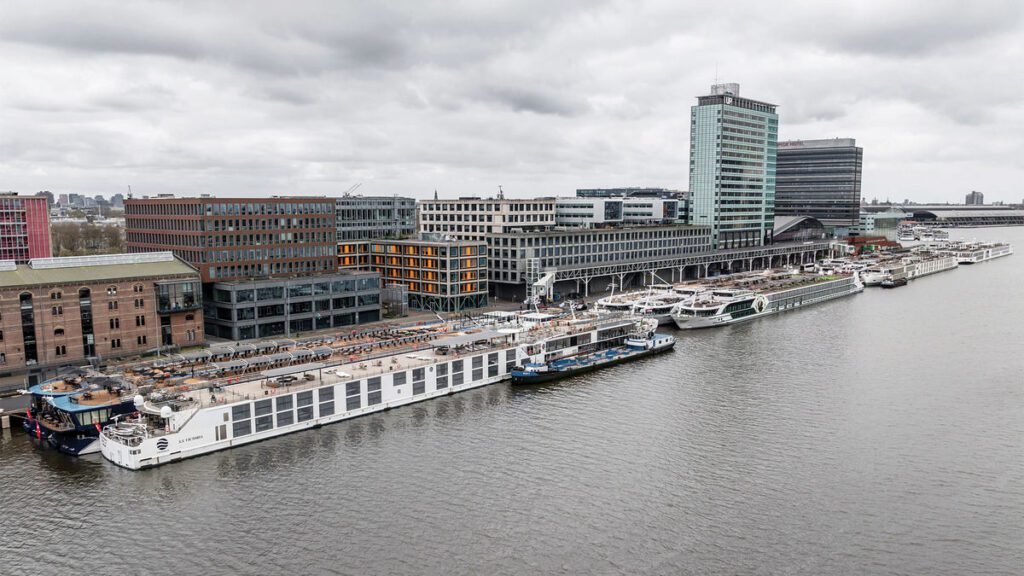Several river cruise lines are revamping their itineraries as Amsterdam gears up to reduce river cruise stops by nearly 50%. This initiative is aimed at tackling the growing issue of overtourism, which has raised concerns among residents and city officials alike.
In 2022, Amsterdam welcomed roughly 1,950 river cruise ships, a figure the city plans to decrease by 10% by 2026, according to spokesman Jurre Kuin. Starting next year, cruise lines will receive a specific quota to cap their dockings based on the previous year’s port calls, adjusting their schedules to adhere to these new regulations.
One significant measure to enhance environmental sustainability is that vessels failing to meet the Green Award certification will be prohibited from docking in the city. This new requirement builds on existing environmental standards implemented for ships operating in Amsterdam’s city center since 2023.
In collaboration with the city, IG RiverCruise, the European River Cruise Association, has initiated a working group to combat overtourism. Board member Robbert Verbeek, who is also the CFO of river ship operator Scylla, emphasizes that the influx of river cruise tourists is "temporary and manageable," as these vessels typically spend limited time in any single destination, making their impact less pronounced.
Minimal Disruption for Some Cruise Lines
The planned reductions will not uniformly affect all river cruise companies. While some lines are adjusting their operations for 2026, others have chosen not to make significant changes. Docking allocations are determined by shipping companies, meaning that partners managing booking logistics must cut 10% of total dockings in Amsterdam. Michelle Molnar, associate director of global operations at Tauck, explained that their port booking partner, Scylla, manages these allocations and distributes them among cruise partners. Despite the new restrictions, Tauck, alongside Avalon Waterways and Riviera Travel, does not anticipate substantial impacts.
Many lines seizing the opportunity are introducing passengers to quieter Dutch towns. River cruise specialist Mary Graham of Trips by Mary supports this approach, noting that the river cruise model excels at facilitating visits to smaller ports. For instance, AmaWaterways plans to dock all of its ships at Zaandam, a quaint town 20 minutes from Amsterdam, offering guests a more tranquil arrival experience. Other operators, such as Riverside Luxury Cruises and Emerald Cruises, are also exploring Zaandam as an alternative docking site when Amsterdam is unavailable. On the other hand, Amadeus River Cruises has prepared its 2026 itineraries ahead of time, ensuring they comply with the new docking requirements without needing to change docks or arrange coach transfers.
Wider Efforts to Address Overtourism
Amsterdam, like several European cities, is actively addressing overtourism for the welfare of its residents, seeking to mitigate escalating living costs and infrastructural strain. Starting in 2026, the city will also limit ocean cruise ships to 100 arrivals annually, aiming to distribute tourism more evenly across the area while curbing events like bachelor parties and transitioning hotels into residential spaces.
Although river cruise passengers account for only 2% of the annual visitor count, they contribute approximately $257 million in direct spending, according to IG RiverCruise. Zane Kerby, CEO of ASTA, noted that this direct economic benefit is significant for Amsterdam. Upcoming events, like the ASTA River Cruise Expo in the city, exemplify the industry’s importance.
Kerby points out that restricting river cruise visits won’t completely resolve the city’s crowding issues but could impact its economy adversely. Graham argues that Amsterdam’s approach reflects the industry’s rapid growth, hinting that other cities may follow suit if overtourism persists. She believes river cruise lines should view Amsterdam’s stricter regulations as a chance to differentiate their itineraries. Importantly, clients have expressed that they do not necessarily prioritize visiting Amsterdam on river cruises.
However, this shift has implications for U.S.-based travelers, particularly those seeking convenient nonstop flights to Amsterdam. Linda Terrill, president of The Luxury Travel Group, mentions that many clients have yet to experience the city, and the opportunity to explore Amsterdam often enhances their travel experience. Removing this option could sway some travelers toward alternative itineraries, such as those on the Rhine or Danube rivers.
With these evolving dynamics, river cruise lines must adapt to the new landscape while continuing to offer engaging and memorable travel experiences for their guests. For more insights into river cruising and travel trends, visit Travel Weekly.



